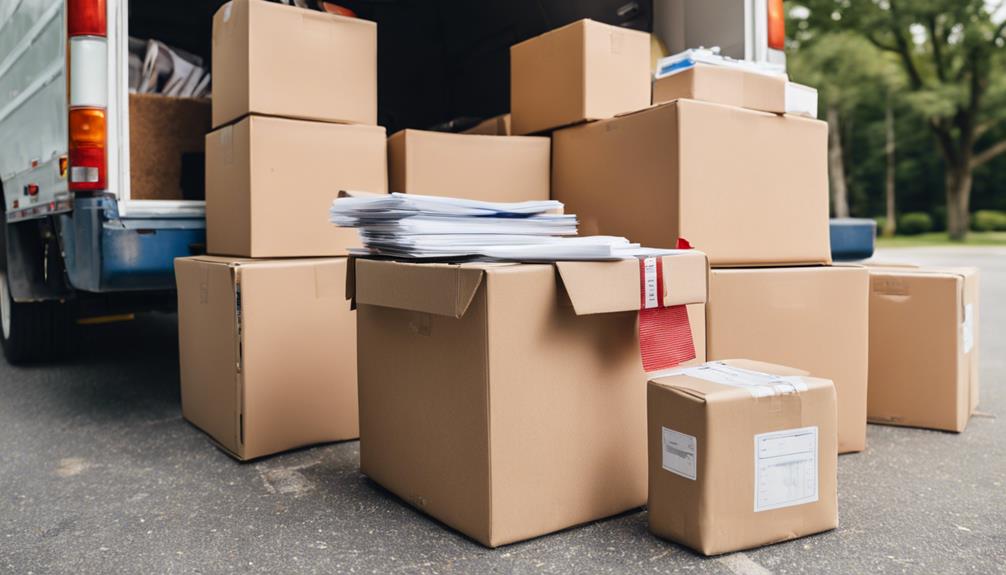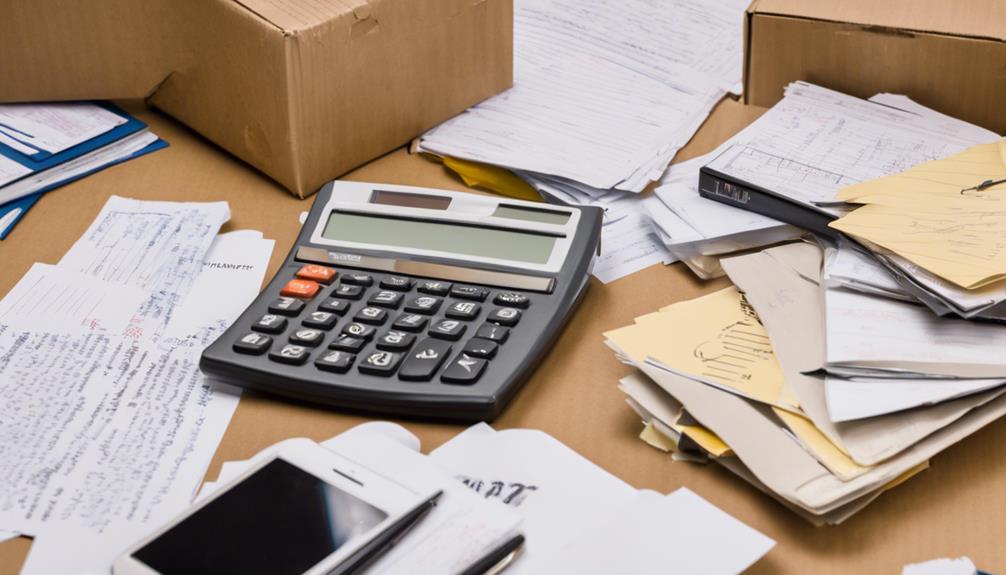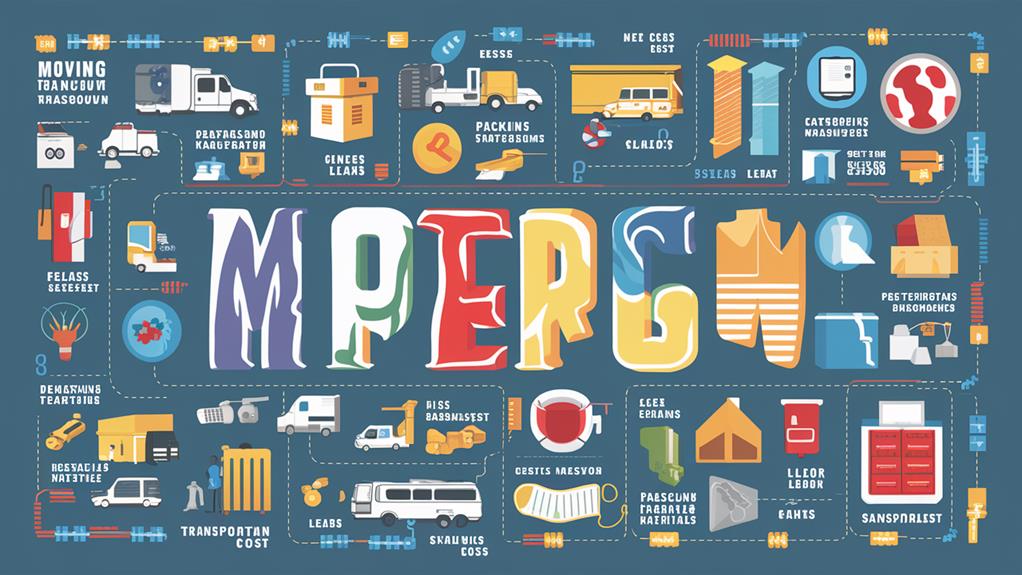When planning a move, it's important to consider various costs. Rental trucks can range from $100 to $1,500 for local trips, while professional moving services may run between $800 and $10,000. Expect to spend $100 to $300 on packing materials like boxes and tape. Cleaning services usually cost around $25 to $80 per hour. Don't forget about insurance, which costs $100 to $300, and move-in expenses, such as utility setup fees averaging $150 to $500. Budget for unexpected costs as well. Understanding these details helps any move go smoothly, and there's more to uncover about budgeting wisely.
Moving Truck Rental Costs

When it comes to moving truck rental costs, you'll want to break down the expenses to avoid any surprises. Renting a moving truck typically costs between $20 to $100 per day, and average rental costs can range from $100 to $1,500, depending on how long you need the truck and its size.
To ensure you stay within budget, consider utilizing a moving calculator for expense estimation; this can help you anticipate costs more accurately. For local moves, you might pay under $50, but long-distance rentals can exceed $2,000 when you factor in all associated fees.
Additional mileage fees may apply if you go beyond a certain limit, so keep that in mind while planning your route. Fuel costs can significantly impact your overall budget, as trucks often consume more gas than regular cars.
Don't forget about insurance for the rental truck, which may be necessary to protect against damages during your move. This can also add to the total cost.
If you're considering a DIY move, budget-friendly rental companies can help you save on costs. By understanding these factors, you'll have a clearer picture of what to expect and can better manage your moving truck rental expenses.
Professional Moving Services
If renting a truck feels like too much hassle, professional moving services might be a better fit for you. Hiring professional movers can simplify your move significantly.
For local moves, you can expect to pay between $800 and $2,500, depending on the size and complexity of your move. If you opt for full-service movers, costs can range from $2,300 to $10,000, as they often handle everything from packing to unpacking and even furniture assembly.
When hiring professional movers, it's good to get cost estimates from different moving companies. This way, you can compare services and find the best fit for your needs.
For local moves, the average hourly rate for professional movers is between $25 and $50 per mover. Typically, a one-bedroom apartment takes about four hours to move, so plan your budget accordingly.
Don't forget that tipping is customary for professional movers, with a suggested amount of 15% to 20% of the total moving cost.
Always vet moving companies and obtain written contracts to ensure everything is clear. With the right planning, hiring professional movers can make your move smooth and stress-free.
Packing and Moving Supplies

Packing for a move can feel overwhelming, but having the right supplies makes a big difference. First, consider essential packing supplies like moving boxes, packing tape, and bubble wrap. These items typically cost between $100 and $300 on average, so budgeting for them upfront is important.
You'll also want quality packing materials, such as furniture pads and blankets, to protect your belongings during transit. Opting for professional packing services can also enhance the safety of your items, ensuring they're packed efficiently and securely.
Don't forget to label your boxes with markers to keep everything organized. If you have special items, like electronics or fragile dishes, investing in specialty boxes is a wise choice. These may need to be rented or purchased, adding to your overall packing supply costs.
Many people overlook the total accumulation of packing materials, which can significantly impact their moving budget. To help reduce waste, consider eco-friendly packing options that still provide adequate protection for your items.
Cleaning Services
Cleaning services play a crucial role in the moving process, ensuring both your old and new homes are spotless and ready for occupancy.
Hiring professional cleaners can save you time and stress, allowing you to focus on settling in. When planning your budget, remember that cleaning services typically cost between $25 to $80 per hour. Additionally, you might spend $100 to $300 on cleaning supplies, which is essential for a thorough deep cleaning.
Consider the emotional impact of a clean home:
- Start fresh in your new home, feeling relaxed and organized.
- Leave your old home in excellent condition, contributing to a smooth transition.
- Enjoy the peace of mind that comes with a professionally cleaned space.
Many individuals opt for cleaning services to handle deep cleaning tasks, especially when time is tight during the moving process.
By allocating a portion of your budget specifically for these services, you ensure both properties are ready for new occupants and yourself.
Investing in cleaning services is a practical choice that can significantly enhance your moving experience, making it easier to enjoy your new beginning.
Insurance Considerations

When you're planning a move, insurance considerations are crucial to protect your valuable items. Understanding the different levels of moving insurance, such as full value protection and released value protection, can help you select the right coverage for your needs.
You'll want to explore different types of moving insurance, which usually range from $100 to $300, to ensure adequate coverage during transit. Additionally, it's a good idea to review your homeowners or renters insurance policy to fill any gaps that might leave your belongings unprotected.
insurance coverage options can provide further insights into making the best choice.
Types of Moving Insurance
Understanding the types of moving insurance available is crucial for protecting your belongings during a move. You may face unexpected damages, so knowing your options can save you stress and expenses.
Here are some key types to consider:
- Released Value Protection: This is the basic option. It's free but offers minimal coverage at only 60 cents per pound.
- Liability Coverage: This provides limited protection based on the weight of your items, which may not fully cover your valuables.
- Full Value Protection: This is the most comprehensive option, where the moving company covers the replacement or repair of lost or damaged items. It comes at a higher cost but offers peace of mind.
Don't forget to check your homeowners or renters insurance, as it might provide some coverage during the move. This can help fill gaps in your moving insurance, ensuring you're better protected against potential losses.
Coverage for Valuable Items
Protecting valuable items during a move requires careful consideration of insurance options. Moving insurance is crucial for safeguarding your belongings, especially when it comes to high-value items like electronics or jewelry.
There are different types of coverage available. General moving insurance typically protects against moving-related damages, while liability coverage offers protection against loss or damage to your items during the transport process.
Before you move, it's a good idea to review your existing homeowners or renters insurance policies. Sometimes, these policies already cover certain moving-related damages or losses, which could save you money.
However, for particularly valuable items, you might want to consider purchasing additional coverage. This specific insurance can provide greater protection against the risks of loss or damage during the move.
Always ask your moving company about their insurance options and ensure that any coverage you choose is documented in your contract. This way, you can avoid misunderstandings later on.
Cost of Insurance Options
Navigating the cost of insurance options for your move can feel overwhelming, but it's essential to grasp the various prices and coverage types available. Typically, moving insurance options range from $100 to $300, depending on your items' value and the coverage you choose. You might find that many moving companies offer customizable insurance options, so be sure to ask about these when getting estimates.
Here are some key things to consider:
- How much protection do you really need for your valuable belongings?
- Are you aware of the claims processes if something goes wrong?
- Have you checked your existing homeowners or renters insurance for coverage during the move?
Common types of moving insurance include general moving insurance, which covers loss or damage during transit, and liability coverage, which offers limited protection based on weight.
Understanding the terms and conditions, including coverage limits, is crucial to ensure adequate protection. By considering these factors, you can confidently navigate the cost of moving and make informed decisions regarding your insurance options.
Move-In Expenses
When moving into a new home, you might find that move-in expenses can quickly add up. One of the first costs you'll encounter is the security deposit, which is often required for rental properties. This deposit can equal one month's rent or sometimes even more, so make sure to budget accordingly.
Additionally, you'll need to prepare for your first month's rent or mortgage payment, usually due right before you move in.
Don't forget about the potential for small repairs or maintenance tasks that may arise before you settle into your new space. These can add to your initial costs and should be factored into your budgeting.
While utility setup fees, which cover the connection of essential services like electricity and water, are important, we'll discuss those in the next section.
Lastly, it's wise to verify all move-in expenses ahead of time. This helps you avoid unexpected costs during the relocation process. By planning and budgeting for these expenses, you can ensure a smoother transition into your new home.
Utility Setup Fees

When you're moving, utility setup fees can be an important part of your budget, often ranging from $150 to $500.
You might also need to pay initial deposits for services like electricity, gas, and internet, which can add to your upfront costs.
To avoid any surprises, it's a good idea to check with local utility providers ahead of time and plan for these expenses in your moving budget.
Average Setup Cost Estimates
Setting up utilities in your new home can be a crucial part of the moving process, and understanding the associated costs is essential. Utility setup fees can typically range from $150 to $500, depending on the services you need and the utility providers in your area. Connection fees for essential services like electricity, gas, and water may vary by region and often include initial deposits for new accounts.
Additionally, don't forget about internet and cable installation charges, which can add to your overall setup costs. To effectively manage your moving expenses, it's important to anticipate these costs early.
- Imagine the relief of having electricity on the first night in your new home.
- Picture enjoying your favorite shows while settling in, thanks to timely internet setup.
- Consider the convenience of having water ready for your family right away.
Timing for utility service setup is crucial, as delays can affect your move-in date and overall convenience. It's advisable to contact utility providers ahead of time to understand specific fees and requirements for new service connections, ensuring a smoother transition to your new living space.
Required Deposits and Fees
Understanding the required deposits and fees for utility setups is essential to managing your moving budget effectively.
When you're moving, utility setup fees can range from $150 to $500, depending on the services being connected, like electricity, gas, water, and internet. It's important to remember that connection fees often include required deposits, which can vary by utility provider and are usually needed upfront before the services are activated.
During the moving process, budgeting for these utility setup fees is crucial to avoid unexpected expenses.
Since these costs can add up quickly, it's wise to inquire about potential charges when contacting utility companies. Each provider has different policies regarding setup fees, and knowing these details can help you plan ahead.
Timing for Utility Setup
Timing your utility setup can significantly impact your moving experience. It's essential to plan ahead, as utility setup fees can range from $150 to $500, depending on the services being connected, like electricity, gas, and water.
Many utility companies also require deposits for new accounts, which can add to your initial setup costs. If you don't account for these fees, you might face unexpected expenses that could strain your moving budget.
To avoid last-minute stress, consider these points:
- Imagine arriving at your new home with no power or water.
- Picture the frustration of waiting days for internet and cable services.
- Think about how much easier your transition could be with everything ready on move-in day.
Scheduling utility installations ahead of your move-in date ensures that you have the necessary services available right when you need them.
Connection fees for internet and cable can vary widely, so it's a good idea to compare different utility companies for the best rates. By planning ahead and understanding utility setup fees, you can make your move smoother and more enjoyable.
Miscellaneous Costs
When planning your move, it's crucial to account for miscellaneous costs that can sneak up on you. Unexpected expenses can average around $723, so having a solid budget is essential.
One common cost is utility connection fees, which can range from $150 to $500. You'll want to factor this into your overall expenses to avoid surprises.
Cleaning services for your old and new homes can also add to your costs, typically charging between $25 and $80 per hour.
Don't forget about potential small repairs or renovations at your new place, which might be necessary before you settle in. These can lead to unforeseen expenses, so it's wise to prepare for them.
Lastly, administrative costs, like updating your vehicle registration and obtaining a new driver's license, can vary significantly, ranging from $30 to $225 depending on your state.
Conclusion
In conclusion, understanding the different costs involved in moving helps you plan better. You'll need to consider expenses like truck rentals, professional services, packing supplies, and utility setup fees. By breaking down these costs, you can avoid surprises and stay within your budget. Remember to factor in insurance and any extra cleaning services you might need. With careful planning, your move can be more organized and less stressful, allowing you to focus on settling into your new home.
